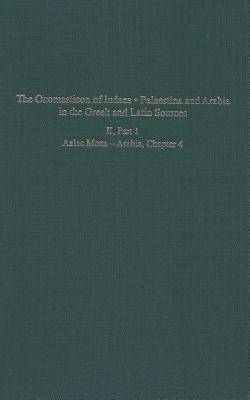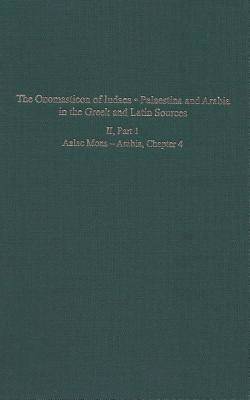
- Retrait gratuit dans votre magasin Club
- 7.000.000 titres dans notre catalogue
- Payer en toute sécurité
- Toujours un magasin près de chez vous
- Retrait gratuit dans votre magasin Club
- 7.000.000 titres dans notre catalogue
- Payer en toute sécurité
- Toujours un magasin près de chez vous
The Onomasticon of Iudaea - Palaestina and Arabia in the Greek and Latin Sources, Volume II, Part 1
Aalac Mons - Arabia, Chapter 4
Leah Di Segni, Judith Green, Yoram Tsafrir
Livre relié | Anglais
177,45 €
+ 354 points
Description
The Onomasticon, a monumental endeavor begun in the 1960s by the late Prof. Michael Avi-Yonah, collates all the known Greek and Latin literary and documentary sources mentioning geographical and ethnic names attested in Iudaea, under the Hasmonaean and Herodian dynasties, and in the Roman and Byzantine provinces of Palaestina and Arabia an area today spread over Israel, the Palestinian Authority, Jordan, Sinai and southern Syria. The source texts, dating from the fourth century BCE to the seventh century CE, are culled from over 1,300 texts by more than 750 separate authors, and from papyri, inscriptions and coins. The individual place names are arranged in alphabetical entries, each presenting a comprehensive collection of excerpts from the texts in which that place is mentioned. Where possible, the places are identified and described on the basis of up-to-date archaeological and bibliographical research. Volume I contains an annotated bibliography of the primary source texts, a collection of major texts from which many of the sources in the alphabetical entries are excerpted, and a listing of all the place names covered in the series. With some 1,400 pages in two parts, Volume II contains the entries for the hundreds of places whose names begin with the letter A, including the massive 438-page entry on Arabia and the sizeable entries for Ascalon (Ashkelon) and Azotus (Ashdod). Alongside entries from the great Onomasticon of Eusebius and the Latin version of Jerome, the source texts include descriptions of the landscape, fauna and flora of ancient Judaea/Palaestina and Arabia, stories of the pilgrims who made their way to the holy places, accounts of the battles for the liberation and conquest of the land, lists of bishops serving the dioceses of the Holy Land who joined in the great church councils of the Byzantine period, prescriptions for the treatment of diseases, contracts, milestone inscriptions, coins, lading dockets and many other passages of widely varying types. All of the extracts are presented in the original Greek or Latin and in English translation, except for those that were preserved only in Syriac, which are presented in English translation.
Spécifications
Parties prenantes
- Auteur(s) :
- Editeur:
Contenu
- Nombre de pages :
- 688
- Langue:
- Anglais
Caractéristiques
- EAN:
- 9789652082022
- Date de parution :
- 31-12-17
- Format:
- Livre relié
- Format numérique:
- Genaaid
- Poids :
- 263 g







